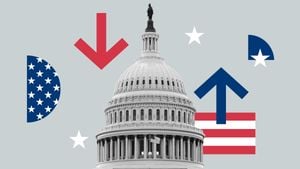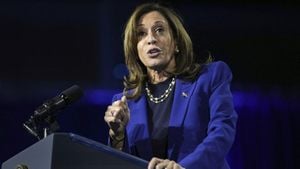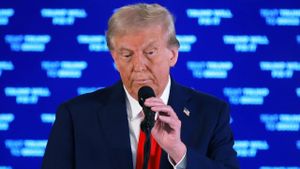Former President Donald Trump’s piercing rhetoric aimed at former Rep. Liz Cheney has ignited widespread criticism, highlighting the tense and often combative nature of contemporary political discourse. During his appearances campaigning for the upcoming election, Trump directed vitriol at Cheney, calling her “a deranged person” and “a radical war hawk.” More troublingly, Trump suggested violent imagery by stating, “Let’s put her with the rifle standing there with nine barrels shooting at her. OK, let’s see how she feels about it.” Such remarks have prompted intense reactions across the political spectrum.
On Friday, Vice President Kamala Harris did not hesitate to condemn Trump’s comments, labeling them as “disqualifying” for anyone aspiring to the presidency. She noted the alarming escalation of violent rhetoric from Trump directed at political adversaries, particularly those who have openly criticized him, like Cheney. “He has increased his violent rhetoric—Donald Trump has—about political opponents and, in great detail, suggested rifles should be trained on former Rep. Liz Cheney. This must be disqualifying,” Harris asserted during her campaign stop.
Harris’s remarks came as Arizona’s attorney general announced the initiation of a review to assess whether Trump’s statements could be interpreted as death threats under state law. Legal experts have diverged on the issue, with some asserting there was no explicit threat. For example, Anthony Kreis, a law professor at Georgia State University, stated, “There’s no true threat here. No call to commence imminent violence. His statement was vile, repugnant, and corrosive to our politics, but it is protected speech.”
Cheney herself has become one of Trump's most vocal critics among Republicans, especially after she broke ranks with him following the January 6 insurrection. Responding to Trump's violent imagery, Cheney stated, “This is how dictators destroy free nations. They threaten those who speak against them with death.” Serious accusations of tyranny were implied as Cheney insisted America could not afford to let “a petty, vindictive, cruel, unstable man who wants to be a tyrant” lead the country.
The back-and-forth between Trump and Cheney frames the broader debate surrounding political rhetoric and accountability. While Trump insists his comments were misinterpreted—claiming he was merely highlighting Cheney’s support for military interventions—critics argue his suggestions could incite real danger.
Interestingly, polling shows Cheney’s criticism of Trump has struck a chord with some American voters, especially moderates and independents concerned about Trump's inflammatory language. Harris’s alignment with Cheney, as they campaign together, updates the narrative around what it means to challenge Trump’s agenda. She referred to Cheney during her rallies as “a true patriot,” acknowledging both their shared experiences of being targeted by Trump.
Trump’s comments were made during the final stretch of the campaign season, and his rhetoric seems aimed at rallying his base, particularly as he races against Harris and seeks to regain lost ground among voters questioning his leadership style. The former president has positioned himself as the underdog against what he describes as “enemies from within” who threaten the American way of life.
Cheney's focus on protecting democracy has made her participation against Trump especially poignant, reflecting the ideological divides within the Republican Party and among American voters. While promoting her unique perspective, Cheney's strategy has been to frame Trump as out-of-touch and dangerous to the democratic ethos of the nation.
Throughout these heated exchanges, Trump has shifted his narrative, casting Cheney as weak and disconnected from the realities of war; “If you gave Liz Cheney a gun and put her on the battlefield facing the enemy, she wouldn’t have the courage and strength or stamina to look the enemy in the eye,” Trump claimed during a rally. Such statements are part of Trump’s broader strategy of portraying opponents as cowardly, invoking military imagery to underline his critiques.
The rapid-fire exchanges between Trump and Cheney, alongside Harris’s emphatic denunciation of Trump’s remarks, illuminate the stakes as the election draws near. The underlying question remains: how far political discourse can go before it becomes dangerous? With the nation closely watching, both Trump and Harris are shaping their messages to resonate with voters who may feel increasingly anxious about the direction of American politics.
Key moments from events held this past week indicate the rhetorical strategy both sides are employing. Harris, speaking fervently about the need for dignified leadership, indicated Trump’s style fundamentally challenges what voters expect from their leaders. The vice president emphasized his pattern of targeting dissenters threatens the foundational principles of American governance.
The fallout from Trump’s rally remarks and Harris’s counter-narrative is likely to reverberate beyond this election season. The comments might not only impact Cheney and Trump but could define how political figures within their parties perceive the boundaries of political expression. Political analysts are now left to ponder whether this escalation of words will lead to actual repercussions or remain confined to fiery exchanges within the halls of political events.
With only days remaining before the election, the stakes are higher than ever. The growing tensions and the polarized views on leadership styles complicate voter sentiment, leaving many questioning the role of rhetoric and responsibility among political figures. Both Cheneys' and Trump's actions raise questions about the political climate and the boundaries of acceptable discourse as they intersect with the democratic process.



